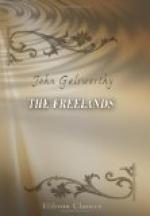Malloring read this letter twice, and the enclosure three times, and crammed them deep down into his pocket.
It was pre-eminently one of those moments which bring out the qualities of Norman blood. And the first thing he did was to look at the barometer. It was going slowly down. After a month of first-class weather it would not do that without some sinister intention. An old glass, he believed in it implicitly. He tapped, and it sank further. He stood there frowning. Should he consult his wife? General friendliness said: Yes! A Norman instinct of chivalry, and perhaps the deeper Norman instinct, that, when it came to the point, women were too violent, said, No! He went up-stairs three at a time, and came down two. And all through dinner he sat thinking it over, and talking as if nothing had happened; so that he hardly spoke. Three-quarters of the hay at stake, if it rained soon! A big loss to the farmers, a further reduction in rents already far too low. Should he grin and bear it, and by doing nothing show these fellows that he could afford to despise their cowardly device? For it was cowardly to let his grass get ripe and play it this low trick! But if he left things unfought this time, they would try it on again with the corn—not that there was much of that on the estate of a man who only believed in corn as a policy.
Should he make the farmers sack the lot and get in other labor? But where? Agricultural laborers were made, not born. And it took a deuce of a lot of making, at that! Should he suspend wages till they withdrew their demand? That might do—but he would still lose the hay. The hay! After all, anybody, pretty well, could make hay; it was the least skilled of all farm work, so long as the farmers were there to drive the machines and direct. Why not act vigorously? And his jaws set so suddenly on a piece of salmon that he bit his tongue. The action served to harden a growing purpose. So do small events influence great! Suspend those fellows’ wages, get down strike-breakers, save the hay! And if there were a row— well, let there be a row! The constabulary would have to act. It was characteristic of his really Norman spirit that the notion of agreeing to the demand, or even considering whether it were just, never once came into his mind. He was one of those, comprising nowadays nearly all his class, together with their press, who habitually referred to his country as a democratic power, a champion of democracy—but did not at present suspect the meaning of the word; nor, to say truth, was it likely they ever would. Nothing, however, made him more miserable than indecision. And so, now that he was on the point of deciding, and the decision promised vigorous consequences, he felt almost elated. Closing his jaws once more too firmly, this time on lamb, he bit his tongue again. It was impossible to confess what he had done, for two of his children




